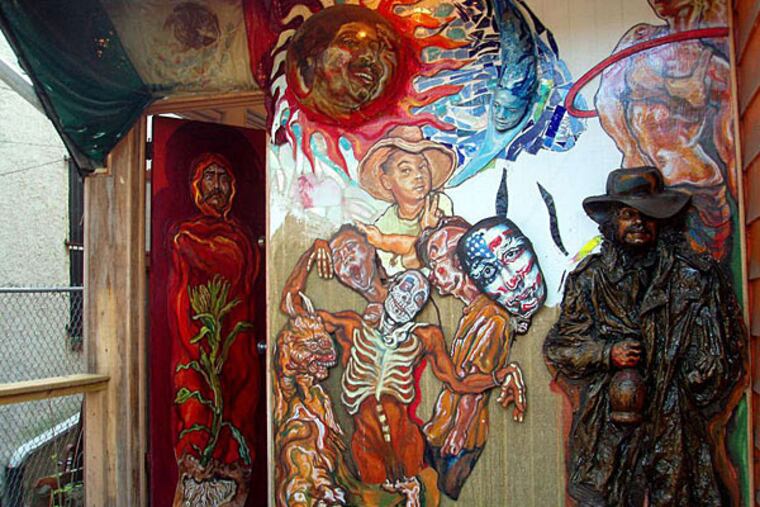The Tiberinos: "West Phila.'s Wyeths"
Tiberino: The Art of Life, a feature-length documentary to premiere Saturday at the Trocadero, does what no single, intricate, incendiary Tiberino painting or sculpture or mural or wall relief or carving or mask or etching can do: encapsulate the wide-reaching aesthetics and cultural importance of a family so creatively accomplished as to be called the "West Philly Wyeths."

Tiberino: The Art of Life, a feature-length documentary to premiere Saturday at the Trocadero, does what no single, intricate, incendiary Tiberino painting or sculpture or mural or wall relief or carving or mask or etching can do: encapsulate the wide-reaching aesthetics and cultural importance of a family so creatively accomplished as to be called the "West Philly Wyeths."
The film, by local director Derrick Woodyard and family patriarch Joseph Tiberino, 76, is a cinematic testament to not only the elder's work, but also that of his wife, Ellen Powell Tiberino, the late doyenne of African American art.
Anyone who has been to the family's panoramic garden enclave at 38th and Hamilton Streets, the Ellen Powell Tiberino Memorial Museum, can attest to its wild abundance of riches. Founded in 1999, seven years after its namesake's death from cancer at 54, it is home and studio not only to Joseph Tiberino, but also to their offspring - painter/comics artist Raphael, muralist Gabe, and sculptor/ceramicist Ellen.
Politicized, spiritualized, and certainly personalized, the space brims with hundreds of works that tell the Tiberinos' continuing story, and that of the besieged community around them. There is Ellen Powell Tiberino's seven-foot relief sculpture crafted after the 1985 MOVE tragedy. There is Joseph Tiberino's wall of black heroes, celebratory and caustic.
"In the three years we spent on the film, I witnessed repeatedly how those who come in contact with the family or visit the museum become immersed in the world the Tiberinos created," says Woodyard, 28, a native of Elizabeth, N.J., who studied film at the Art Institute of Philadelphia. "That world is theirs alone, yet they share it with anyone who loves adventurous art."
Woodyard succumbed to the family's disarming art after befriending Gabe Tiberino at the Art Institute. Exploring the museum during one its performance events, the fledgling filmmaker fell in love with "the compound," a complex of four houses and several courtyards with art everywhere.
Then he met Joseph Tiberino. A filmmaker in his own right, Tiberino had lensed The Mural, a 1985 mockumentary about the avant-garde habitues who hung at the Bacchanal, the family's art bar on South Street.
"I can't remember our first conversation but certainly it took place over wine," Woodyard says with a laugh. The elder Tiberino told him about a project he had been trying to get off the ground, a documentary.
Its highlight reel: the 1967 marriage of two Philadelphia Catholic kids, the African American Ellen Powell and the Caucasian Joseph Tiberino; Ellen Tiberino as the first artist with a one-person show at Philly's Afro-American Historical and Cultural Museum; art world comparisons of this husband-and-wife team to Frida Kahlo and Diego Rivera; and Ellen Tiberino's 14-year battle with cancer that left her bedridden but working more forcefully and spiritually than ever.
While making the film, Woodyard moved into the Tiberino compound, where he learned "the essence of what the Tiberinos embody, artists in the communal process." What information he needed, Woodyard says, was best gathered through casual afternoon conversation in the garden. "You can't just interview Joe Tiberino - that's not how he imparts information," Woodyard says. "Every chat with Joe was told as if it were the grandest tale."
Because the two co-directed the film, "there had to be compromises on both sides," Woodyard says. "The trade-off between what's portrayed and what's omitted is personal and deep, especially regarding the passing of his wife." Joseph Tiberino provides one of the most moving moments in the film when he talks about "The Operation," a black-and-white painting depicting gossipy skeletons and surgeons that his wife produced near the end of her life.
Indeed, of all the family history that Tiberino: The Art of Life touches on, what stands out to Woodyard is Ellen and Joseph Tiberino's marriage, an interracial relationship forged in the heat of the civil rights movement of the 1960s. "This is a pivotal piece of their story," Woodyard says, "because it sets the tone for the artwork they'd create together - controversial at times, yet always poignant and strong."
The next phase for the film will be securing digital and physical distribution - "Netflix, Hulu, or another online streaming service, in addition to selling DVDs," according to Woodyard - and submitting to festivals.
"One of my goals for the film is to raise awareness about this amazingly talented family of artists and the museum they call home," Woodyard says. "Knowing the Tiberinos has been a journey that transcends my involvement with the film. I've become family."
MOVIE
Tiberino: The Art of Life
8 p.m. Saturday at the Trocadero, 1003 Arch St.
Tickets: $10-$15. Information: 215-922-6888 or www.thetroc.com
EndText